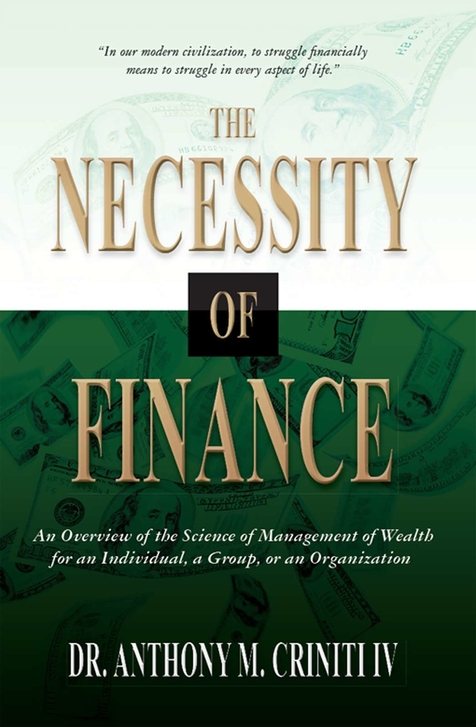
Financial expert Dr. Anthony M. Criniti IV has constructed a highly useful manual for the academic and layman’s study of finance, something that nearly all of us have to deal with, in The Necessity of Finance: An Overview of the Science of Wealth for an Individual, a Group, or an Organization.
Criniti promotes finance not merely as an aspect of economics but as a science in its own right, a “search for a truly better way to perform an action or understand a condition, process, or thing.” Seen in that light, finance explores optimal ways “to manage wealth for an individual, a group, or an organization.” Even those who wish to avoid money for whatever reason will have to deal with it, for health or other concerns, at some point in their lives.
Criniti begins by defining wealth. Someone may appear wealthy in terms of assets – home, cars, clothing – yet struggle with high debt, while someone with no apparent accumulated assets may have sufficient cash to survive in a crisis. He therefore limits the concept of “wealth” to “net worth.” Finance is the method used to maximize wealth, with the goal to increase current assets, and not mere survival. There are various professionals who assist in the process, and since they deal with large amounts of others’ assets, it is important to know and trust one’s financial managers.
Providing some fascinating and necessary historical context, Criniti outlines how the history of wealth and its management arguably begins with Adam Smith’s 1776 work, The Wealth of Nations. Smith, Criniti says, could be looked upon as the “founder of modern finance,” though he is generally considered to be the father of economics, which differs from finance, Criniti repeatedly emphasizes, in many significant ways. Economic thinkers of the mid-20th century onward include Markowitz, Sharpe, and Fama, whose works the author acknowledges for their specific contributions to the science of finance.
Criniti, who is both a professor of finance and an experienced investor and financial consultant, wishes to gain purchase for his strongly held theory that finance is a true science, a practical construct in which new techniques are constantly being devised to deal with new alterations to the management of wealth. Finance requires no more math than arithmetic and basic algebra, but also necessitates the grasp of concepts such as “total rate of return” and “time value of money.”
As evidence of his well-honed teaching skills, Criniti offers simple yet compelling examples of the tools needed for one to become, or work closely with, a financier. In later chapters he goes step-by-step through some of the requisite abilities for an investor, emphasizing that investing is “not associated with playing any perceived ongoing game of chance,” but is meant to maximize one’s wealth “based on acceptable levels of time and risk.” From there he moves to such details as a basic definition of capitalism, the wisest use of financial agents, the way that taxes can impinge on financial planning, and how financial programs affect health, ethics, and the environment, for an impressively well-balanced overview of the subject.
All told, Criniti’s work has far more information than normally found in a book of this kind. Importantly, it is woven well into the book’s overall focus of effective money management. While some of this information may not, at first glance, seem wholly vital to immediately start managing money, the historical and scientific basis for managing capital is fascinating in its own right, and does provide solid precepts for financial organization that have stood the test of time.
A definitive, highly readable work of financial scholarship, The Necessity of Finance will be of special interest to students of finance, but should also be read by anyone considering the prospect of managing one’s wealth at any realistic level.
Book Links
STAR RATING
Design
Content
Editing
Get an Editorial Review | Get Amazon Sales & Reviews | Get Edited | Get Beta Readers | Enter the SPR Book Awards | Other Marketing Services























Leave A Comment